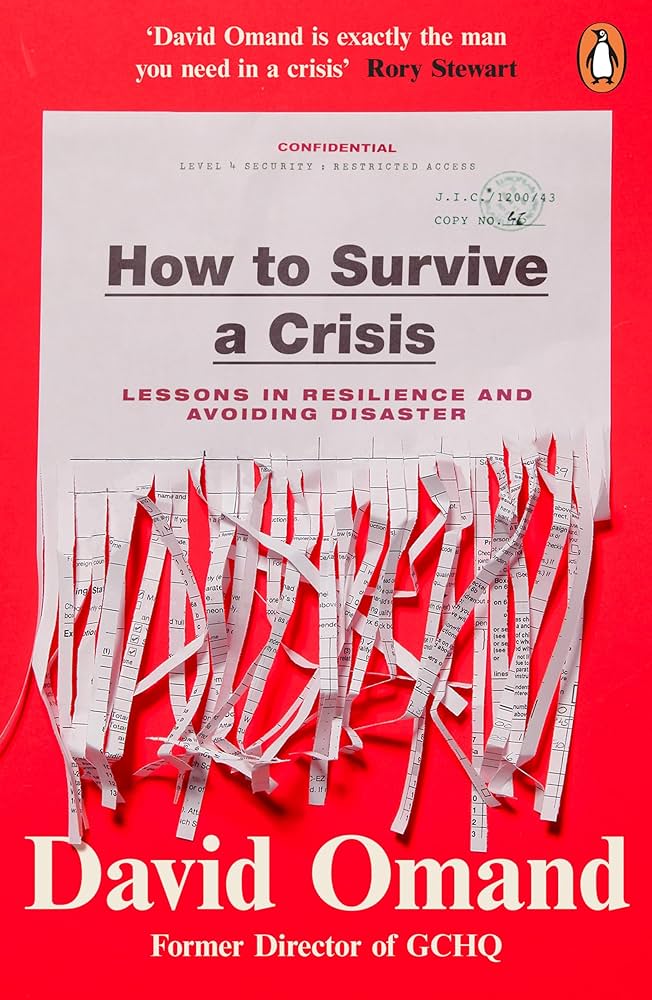How to survive a crisis? I’m guessing that many of us in the civil service feel like we’ve been doing little else in recent years. Whether it’s the pandemic, the war in Ukraine, climate change or cyber disruption, many of us have felt the impact of the crises that have buffeted the UK. Some might argue that we have been thrown into the centre of continuous crises without any training in crisis management.
Sir David Omand’s book sets out to provide a manual for crisis management in business and government. He has the credentials to claim authority on this: Omand was a senior civil servant in the MoD during the Bosnian war, then director of GCHQ; he progressed to the role of permanent secretary in the Home Office before becoming the UK’s first security and intelligence co-ordinator. Since retiring in 2005 he has worked in academia and business and has frequently been called back to government to assist with crisis planning, including for the 2012 Olympics. Part manual and part autobiography, the book draws on Omand’s experience from across his career, incorporating case studies from business and government to bring out some broad lessons in crisis preparedness and management.
 ❱ How to Survive a Crisis: Lessons in Resilience and Avoiding Disaster
❱ How to Survive a Crisis: Lessons in Resilience and Avoiding Disaster
❱ David Omand
❱ Penguin
Those familiar with UK government crisis management doctrine will find much that is familiar here. But Omand takes dry doctrine and explains why it matters, showing that it can be the difference between success and failure in a crisis situation. At the centre of his argument is the principle that crisis management is like performance art. You have to plan, prepare and rehearse before taking to a well-prepared stage (ideally your properly-equipped crisis management centre), then do your best no matter what happens during the performance. He makes a compelling case for proper, systematic crisis preparedness for businesses and governments, and also addresses the biases that get in the way of that: group think, short termism, lack of investment in preparation and planning, and an inability to spot (or an unwillingness to grapple with) slow burn crises. The chapters take you through lessons in preparedness, the arc of a crisis from start to finish, and foresight. At the end of each chapter Omand provides a short summary and lists the key lessons. It is a reminder that most of the work of crisis management is not the glamour of tense situation rooms but of careful, long-term (dare I say dull) forecasting and preparation, combined with a refusal to be complacent.
Having worked on various crises, both in London and overseas, and having spent time in the FCDO’s crisis management department, Omand’s recommendations resonated with me. I could see how FCDO had learned many of its lessons the hard way. I was impressed by Omand’s ability to package up a lifetime’s experiences and UK crisis doctrine into an easily accessible manual. The sections on cyber resilience were particularly useful for me as a primer for a non-IT specialist. Omand’s precise and methodical writing style (no doubt honed over a whole career of civil service drafting) while occasionally feeling a little pedantic, also helped to take the drama and mystery out of crisis management and pinpoint the real-life actions that make a decisive difference. As a brigadier responsible for the UK military’s crisis deployments once told me: “Crisis management is not strategic or tactical, it’s practical.”
This book should be required reading for anyone in government, especially in a leadership role, who is responsible for resilience in their organisation or who might come across crisis work. It is quite high level, mostly focusing on whole systems and on policy at national or corporate board level, with less emphasis on the impact of crisis on individuals (although it does touch on this). To see both sides of crisis work I would recommend reading Omand’s book alongside Lucy Easthope’s When the Dust Settles, which deals with the human cost of crisis and disaster.
Omand’s call for greater national resilience is an impassioned warning to all of us. When faced with short-termism and wishful thinking in the face of future risks, Omand argues, we must not ignore those risks but do what we do best: make sure our political leaders understand them, and find practical ways to overcome them.
Crispian Wilson is a diplomat, currently serving as political counsellor at the British Embassy in Warsaw